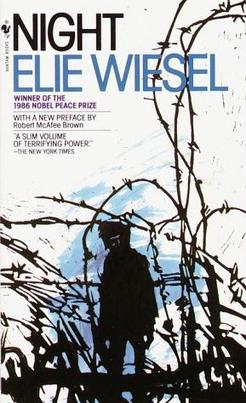Night

Night is a 1960 book by Elie Wiesel based on his Holocaust experiences with his father in the Nazi German concentration camps at Auschwitz and Buchenwald in 1944–1945, toward the end of the Second World War in Europe. In just over 100 pages of sparse and fragmented narrative, Wiesel writes about the death of God and his own increasing disgust with humanity, reflected in the inversion of the parent–child relationship as his father deteriorates to a helpless state and Wiesel becomes his resentful, teenage caregiver. “If only I could get rid of this dead weight … Immediately I felt ashamed of myself, ashamed forever.” In Night everything is inverted, every value destroyed. “Here there are no fathers, no brothers, no friends”, a kapo tells him. “Everyone lives and dies for himself alone.”[2]
Wiesel was 16 when Buchenwald was liberated by the United States Army in April 1945, too late for his father, who died after a beating while Wiesel lay silently on the bunk above for fear of being beaten too. He moved to Paris after the war and in 1954 completed an 862-page manuscript in Yiddish about his experiences, published in Argentina as the 245-page Un di velt hot geshvign (“And the World Remained Silent”).[3] The novelist François Mauriac helped him find a French publisher. Les Éditions de Minuit published 178 pages as La Nuit in 1958, and in 1960 Hill & Wang in New York published a 116-page translation as Night.
Translated into 30 languages, the book ranks as one of the bedrocks of Holocaust literature.[4] It remains unclear how much of Night is memoir. Wiesel called it his deposition, but scholars have had difficulty approaching it as an unvarnished account. The literary critic Ruth Franklin writes that the pruning of the text from Yiddish to French transformed an angry historical account into a work of art.[5][6]
Night is the first in a trilogy—Night, Dawn, Day—marking Wiesel’s transition during and after the Holocaust from darkness to light, according to the Jewish tradition of beginning a new day at nightfall. “In Night,” he said, “I wanted to show the end, the finality of the event. Everything came to an end—man, history, literature, religion, God. There was nothing left. And yet we begin again with night.”[7]
Elie Wiesel was born on 30 September 1928 in Sighet, a town in the Carpathian mountains of northern Transylvania (now Romania), to Chlomo Wiesel, a shopkeeper, and his wife, Sarah, née Feig. The family lived in a community of 10,000–20,000 mostly Orthodox Jews. Northern Transylvania had been annexed by Hungary in 1940, and restrictions on Jews were already in place, but the period Wiesel discusses at the beginning of the book, 1941–1943, was a relatively calm one for the Jewish population.[8]
That changed at midnight on Sunday, 18 March 1944, with the invasion of Hungary by Nazi Germany, and the arrival in Budapest of SS-Obersturmbannführer Adolf Eichmann to oversee the deportation of the country’s Jews to the Auschwitz concentration camp in German-occupied Poland. From 5 April, Jews over the age of six had to wear a 10 x 10 cm (3.8 x 3.8 in) yellow badge on the upper-left side of their coats or jackets.[9] Jews had to declare the value of their property, and were forbidden from moving home, travelling, owning cars or radios, listening to foreign radio stations, or using the telephone. Jewish authors could no longer be published, their books were removed from libraries, and Jewish civil servants, journalists and lawyers were sacked.[10]
